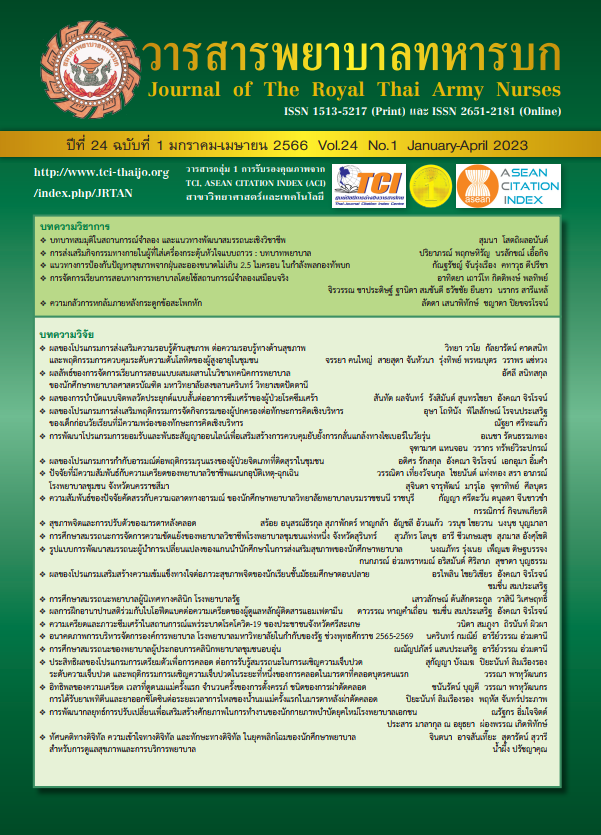Stress and Depression in COVID-19 Pandemic among the People Sisaket Province
Keywords:
Stress, Depression, COVID-19Abstract
A Retrospective descriptive study aims to determine the Stress and Depression in COVID-19 Pandemic among the People Sisaket Province. Target population is people above 15 years old and was chosen by purposive sampling from people whom answering the COVID-19 mental health questionnaire from department of mental health’s program called in “MENTAL HEALTH CHECK IN” during April 2021 total of 15,310. Method, the data was conducted by questionnaire that was developed by department of mental health which included 1) Personal data 2) Risk factors 3) Stress test (ST5), Patient health questionnaires to determine the depression which consist of 2Q and 9Q. Statistical calculations method used are frequency distributions, percentages and regression analysis. Result reveal that 15.90% of People Sisaket Province have stress and 1.36% have depression. Sex (especially female), history of mental health illness or taking anti-psychotic medications, patient infected COVID-19, people under state quarantine, unemployed people, people with financial problems, people with low income or with liability and family with bedridden patient. These are risk factors that associated with stress, and sex (female), age (60 years old above) and history of mental health illness or taking anti-psychotic medications, unemployed people, people with financial problems, people with low income or with liability and family with bedridden patient. These are risk factors associated with depression. Statistically significant p<.05.
Downloads
References
Li H, Liu S, Yu X, Tang S. & Tang C. Coronavirus disease2019 (COVID-19): current status and future perspectives.International Journal of Antimicrobial Agents. 2020; 55(5): 105951.
Cucinotta D. & Vanelli M. WHO Declares COVID-19 a Pandemic. Acta bio-medica: Atenei Parmensis. 2020; 91(1): 157-60.
Department of Disease Control, Ministry of Public Health. Coronavirus Disease 2019 Situation Report No.483 Date 30 April 2021. Nonthaburi: Retrieved May 2, 2021. (in Thai)
Sisaket Provincial Public Health Office: Retrieved April 30, 2021. (in Thai)
Xiong J, Lipsitz O, Nasri F, Lui LM, Gill H, Phan L, et al. Impact of COVID-19 pandemic on mental health in the general population: a systematic review. Journal of Affective disorders. 2020; 277: 55-64.
Salari N, Hosseinian-Far A, Jalali R, Vaisi-Raygeni A, Rasoulpoor S, Mohammadi M, et al. Prevalence of stress, anxiety, depression among the general population during the COVID-19 pandemic: a systematic review and metaanalysis. Globol Health. 2020; 16(1): 57.
Department of Mental Health. Covid 19 and mental health [Mental Health Check In] [Internet]. Nonthaburi: Department of Mental Health: 2020.Retrieved May 2, 2021.(in Thai)
Wang J, Zhou Y, Laing Y. & Liu, Z. A Large Sample Survey of Tibetan People on the Qinghai-Tibet Plateau: Current Situation of Depression and Risk Factors. International Journal of Environmental Reseorch. Public Health. 2019; 17:289.
Wongpiromsarn Y. Mental health and the COVID-19 crisis in Thailand. Journal of Mental Health of Thailand 2021; 28(4): 280-91. (in Thai)
World Health Organization [WHO]. Depression and other common mental disorders: Global health estimates. Geneva: WHO Document Production Services; 2017.
World Health Organization [WHO]. Depression: Let’s talk. Retreived 2021 April 26.
American Psychiatric Association. Diagnostic statistical manual of mental disorders. (4 thed). Text revision: Washington DC; 2002.
Beck AT, Steer RA. & Carbin G. Psychometric Properties of The Beck Intervention. Clinical Psychology Review. 1988; 8(1): 77-100.
Kupferberg A, Bicks L, Hasler G. Social functioning in major depressive disorder. Neuroscience & Biobehavioral Reviews. 2016; 10(69): 313-32.
Lauboonthawatchai A. Mental Health and Psychiatric nursing. 5thed. Chulalongkorn Printing Office; 2556. (in Thai)
Abdollahi A, Talib M. A. & Yaacob, S. N. Problem-solving skills and suicidal ideation among Malaysian college student: the mediating role of hopelessness. Academic Psychiatry.2016; 40(2): 261-7.
Wang C, Pan R, Wan X, Tan Y, Xu L, Ho Cs, et al. Immediate Psychological responses and associated factors during the initial stage of the 2019 Coronavirus disease (COVID-19) epidemic among the general population in China. International Journal of Environmental Reseorch. Public Health. 2020; 17(5):1729.
Sangsirilak A. & Sangsirilak S. Stress and Depressed Mood in Healthcare Workers During COVID-19 Outbreak. Journal of the Psychiatry Association of Thailand 2020; 65(4): 400-8. (in Thai)
Wijitraphan T. Prevalence and factors associated with stress and depression in COVID-19 pandemic among residents of Tung Seaw primacy care clinic, Sanpathong District, Chiang Mai Province. Journal of Mental Health of Thailand 2021; 29(1): 12-21. (in Thai)
The Inter-Agency Standing Committee. Interim Briefing Note: addressing mental health and psychological aspects COVID-19 outbreak (Version 1.5) [Internet]. Geneva: Inter-Agency Standing Committee (IASC); c2020.
Strategy Bureau Department of Mental Health. Strategic Plan of the Department of Mental Health during the Development Plan National Economy and Society, (2017-2021). 2017. (in Thai)
Vacarolis E.M. Foundations of psychiatric mental health nursing: A clinical approach, 4thed., New York: W.B. Saunder. 2002.
Stree H, Sheeran P. & Orbell S. (1999) “Conceptualizing Depression: An Integration of 27 Theories.”Clinical Psychology and Psychotherapy. 1999; 6.
Grotberg E. H. A guide to promoting resilience in children: Strengthening the human spirit. TheHague: The Bernard van leer foundation. 1995.
Aguilera D.C. Crisis intervention. In: Birckhead, LM, editor. Psychiatric/mental health Nursing. Philadelphia: J. B. Lippincott; 1989. p. 229-50.
Deparment of mental health. Knowledge of mental health care in epidemic situations Covid-19 “The mind is ready. I won’t be sick. Department of Mental Health, Ministry of Public Health; April 2020. (in Thai)
Suktawee S, Soonthornchaiya R. & Jirarode A. The Effect of a Reminiscence Program on The Resilience Among Older Adults with Depression. Journal of The Royal Thai Army Nurses. 2021; 22(1): 235-43. (in Thai)
Downloads
Published
How to Cite
Issue
Section
License
Copyright (c) 2023 Journal of The Royal Thai Army Nurses

This work is licensed under a Creative Commons Attribution-NonCommercial-NoDerivatives 4.0 International License.
บทความหรือข้อคิดเห็นใดใดที่ปรากฏในวารสารพยาบาลทหารบกเป็นวรรณกรรมของผู้เขียน ซึ่งบรรณาธิการหรือสมาคมพยาบาลทหารบก ไม่จำเป็นต้องเห็นด้วย
บทความที่ได้รับการตีพิมพ์เป็นลิขสิทธิ์ของวารสารพยาบาลทหารบก
The ideas and opinions expressed in the Journal of The Royal Thai Army Nurses are those of the authors and not necessarily those
of the editor or Royal Thai Army Nurses Association.






